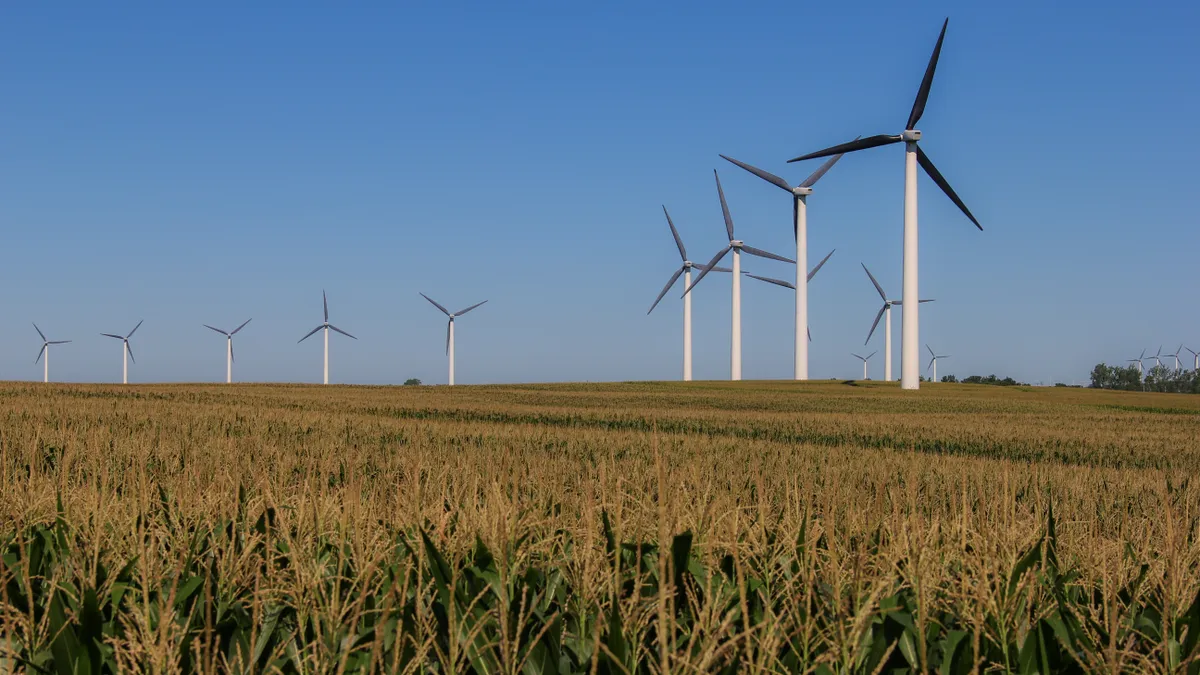Dive Brief:
-
Alliant Energy, DTE Electric, NextEra Energy Resources and others are urging federal regulators to reject the Midcontinent grid operator’s proposal to impose a cap on the total megawatts that could apply for approval in each interconnection review cycle.
-
Instead of improving the Midcontinent Independent System Operator’s interconnection process, the proposed cap — one proposal of a two-part interconnection reform plan — would create “an unworkable queue that undermines competition, raises rates, and threatens reliability,” renewable energy trade groups said in joint comments filed Monday at the Federal Energy Regulatory Commission.
-
In a separate “limited protest,” the groups — the American Clean Power Association, the American Council on Renewable Energy, the Solar Energy Industries Association and Clean Grid Alliance — said elements of MISO’s reform proposal focused on interconnection milestone payments, withdrawal penalty requirements, and site control rules needed changes. MISO asked FERC to allow its two proposals to be able to take effect by Jan. 22 so it can move forward with its stalled interconnection review process in March.
Dive Insight:
Like other grid operators, MISO has seen an explosion in interconnection requests across its territory, which runs from Louisiana to North Dakota. MISO’s 2022 interconnection queue cycle included 171 GW, exceeding its peak load by about 50 GW, according to the grid operator.
The “extraordinary sizes” of MISO’s ongoing queue cycles lead to unrealistic and untenable interconnection study results, driving project withdrawals that create delays and increased uncertainty for projects that remain in the queue, the grid operator told FERC.
After a six month stakeholder process, MISO last month proposed two sets of reforms to its interconnection process: the cap on the amount of capacity to be studied in a cycle and the new requirements aimed at weeding out speculative projects. The proposals are consistent with FERC’s new interconnection requirements, according to MISO.
The proposals are supported by the Organization of MISO States, which represents state utility commissions, and transmission owners in MISO’s footprint, including utilities such as Ameren, Duke Energy and Xcel Energy.
On the issue of the cap, the transmission owners said it offers MISO “a realistic way to handle the massive amount of interconnection volume being proposed, while simultaneously taming the currently unworkable study results.”
However, Alliant, DTE and AES Indiana told FERC in separate filings the proposed interconnection queue cap may make it harder for them to meet their clean energy goals and reliability obligations.
“The proposed cap further threatens reliability in the MISO footprint by creating a potential barrier for entities responsible for resource adequacy requirements from entering needed projects into the interconnection queue,” Alliant said.
Under its cap proposal, MISO would release information about the cap 10 business days before an interconnection window opens. Interconnection requests would be processed in the order they are received. After the cap is met, interconnection requests would be put into the next queue cycle. MISO estimates that its proposed queue cap formula will result in a cap for the 2023 cycle totaling 76,560 MW.
MISO proposed several exemptions to its cap, including for requests from a state utility commission, cooperative utility board or other “relevant electric retail regulatory authority,” or RERRA.
If approved, MISO said it would consider revising its cap process after three interconnection study cycles.
MISO’s cap proposal would produce perverse incentives that will “create havoc, increase uncertainty, and discriminate against the very clean energy resources that the region needs,” the renewable energy trade groups said.
Under the plan, project developers would be forced to make “a mad dash” to submit projects to avoid being locked out of the interconnection process for several years, they said. At the same time, MISO’s proposed exemptions would enable some projects to avoid the cap, introducing a discriminatory two-tiered interconnection process.
“MISO’s proposal notably achieves a hat trick of Federal Power Act … violations: The filing is unjust, unreasonable, and unduly discriminatory,” the trade groups said.
The Electric Power Supply Association strongly objected to the proposed RERRA exemption. “This exemption would give RERRA resources the unfettered ability to cut the line in MISO’s queue in the initial year and cannibalize and reduce the queue size in future years,” the trade group for independent power producers said.
If approved, the exemption could set an example for other market operators, undermining open and fair access for interconnections across the United States, EPSA said.















